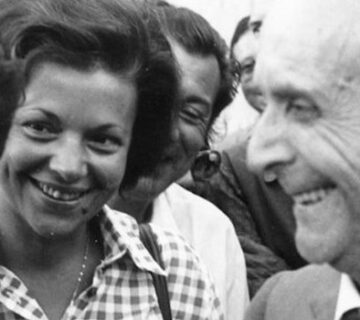 In the eartly Paradise, God conversed with man: the father who dialogues with the son. Sin cut off the dialogue. To restore it, speech (the Word) came into the world and was made flesh: he became the mediator between men and God, and, through Him, dialogue was restored.
In the eartly Paradise, God conversed with man: the father who dialogues with the son. Sin cut off the dialogue. To restore it, speech (the Word) came into the world and was made flesh: he became the mediator between men and God, and, through Him, dialogue was restored.
He gave rise to a new order, the law of which was love. And love is primarily expressed through words: love is not a monologue, it is dialogue: it does not close up within itself, but seeks the other and serves him.
(…) Christ breaks through all the barriers and restores contact with all. He talks also with lost women, also with thieves, forgives the crucifiers (…) he has come for the sinners, not for the just, that do not exist. Saint Paul, changed from a Pharisee to a Christian, risks being killed by his ex party companions, because he talks with the impure, with pagans; those pagans, with whom the zelot israelis did not talk, and from whom he was about to draw the big Church. For him, there were no jews, no greeks, no servants, no masters, no men, no women: but souls, all sons of God.
(…) Already in the second century ,there was a powerful push towards the evangelisation of the world, and therefore to the expansion of christian civilisation, with the dialogue of the greek apologists- Justin at the head-with the pagan thinkers. The former sought in the wisdom of Socrate and Plato and the sages of roman and other race, the seeds of divine Reason, and therefore the elements of solidarity, communion, and equality. Grounds were thus discovered of understanding and they engaged in dialogue,which drew closer gentiles and christians, after they had been further separated by imperial persecutions and teological controversies.
The ills of division and silence came about when religion was stirred up- and mixed- with politics: and so instead of conversing with the moslems, on the example of St. Francis, they battled them losing time, money, souls for generations(…) During all these forms of regression, dialogue was maintained alive by a group of saints.
(…) And dialogue is what, through the push of Pope John XX111 and Paul V1, has drawn closer ortodox and protestants and catholics in a few years, more than the controversies and subtleties, forgetfulness and silence of many centuries.
(…) Religion has no other preclusion but hatred, because it is love. It seeks unity and peace.
Iginio Giordani – Extract from “Ut unum sint”, 1967, n.7, pp.28-30.


 Italiano
Italiano Español
Español Français
Français Português
Português


